We have read extensively in all genres of fiction during the year and, like others who do so, we have our favorites (Nancy’s is fantasy and Carolyn’s is historical fiction). Deciding on a list of only 20 books the two of us could agree upon was a challenge. Here is our notable fiction of 2018 list.
Ages 4–8
Alma and How She Got Her Name. Juana Martinez-Neal. 2018. Candlewick.
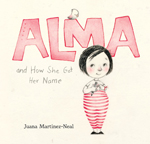 Alma Sofia Esperanza José Pura Candela is a small girl with a big name. When her father shows her photos of the relatives for whom she’s named, she asks about Alma, who is not pictured. He replies, “You are the first and the only Alma. You will make your own story.” In “A Note from Juana,” Martinez-Neal tells about her own long name.
Alma Sofia Esperanza José Pura Candela is a small girl with a big name. When her father shows her photos of the relatives for whom she’s named, she asks about Alma, who is not pictured. He replies, “You are the first and the only Alma. You will make your own story.” In “A Note from Juana,” Martinez-Neal tells about her own long name.
Baby Monkey, Private Eye. Brian Selznick & David Serlin. Ill. Brian Selznick. 2018. Scholastic.
 In this innovative fusion of picture book, graphic novel, and early reader, Baby Monkey is good at being a private detective. A simple, patterned text and expressive black-and-white drawings reveal how Baby Monkey solves cases involving the missing jewels of an opera singer, the pie of a pizza maker, the nose of a clown, and the spaceship of an astronaut before taking on a most important case, which reunites a mother with her baby.
In this innovative fusion of picture book, graphic novel, and early reader, Baby Monkey is good at being a private detective. A simple, patterned text and expressive black-and-white drawings reveal how Baby Monkey solves cases involving the missing jewels of an opera singer, the pie of a pizza maker, the nose of a clown, and the spaceship of an astronaut before taking on a most important case, which reunites a mother with her baby.
The Day You Begin. Jacqueline Woodson. Ill. Rafael López. 2018. Nancy Paulsen/Penguin.
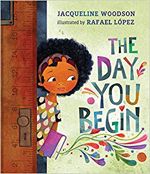 Readers see through the eyes of three children who learn that they are more alike than different when they begin to share their stories. López’s brightly colored, mixed-media illustrations perfectly complement the text and the final page depicting two of the children, Angelina and Rigoberto from Venezuela, swinging together on the playground, says it all. “This is the day you begin.”A Spanish edition, El día en que descubres quién eres, is also available.
Readers see through the eyes of three children who learn that they are more alike than different when they begin to share their stories. López’s brightly colored, mixed-media illustrations perfectly complement the text and the final page depicting two of the children, Angelina and Rigoberto from Venezuela, swinging together on the playground, says it all. “This is the day you begin.”A Spanish edition, El día en que descubres quién eres, is also available.
Drawn Together. Minh Lê. Ill. Dan Santat. 2018. Disney-Hyperion.
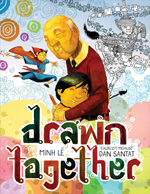 During a visit, a young boy and his grandfather share lunch (although they eat different foods) and television (although the boy would rather watch something else) but cannot share language. When the boy takes out a sketchbook and markers, his grandfather takes out brush and ink. Santat’s illustrations (both black and white and color) show how art becomes a bridge between the two as they draw together.
During a visit, a young boy and his grandfather share lunch (although they eat different foods) and television (although the boy would rather watch something else) but cannot share language. When the boy takes out a sketchbook and markers, his grandfather takes out brush and ink. Santat’s illustrations (both black and white and color) show how art becomes a bridge between the two as they draw together.
Dreamers. Yuyi Morales. 2018. Neal Porter/Holiday House.
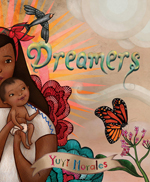 In this beautifully crafted picture book, based on Morales’ own immigration story, a mother and her infant son make their way to a new country. Their discovery of the local library helps the two migrantes face the challenges of living in this strange place. “We learned to read, / to speak, / to write, / and / to make / our voices heard.” Also available in a Spanish edition, Soñadores.
In this beautifully crafted picture book, based on Morales’ own immigration story, a mother and her infant son make their way to a new country. Their discovery of the local library helps the two migrantes face the challenges of living in this strange place. “We learned to read, / to speak, / to write, / and / to make / our voices heard.” Also available in a Spanish edition, Soñadores.
Fox + Chick: The Party and Other Stories. Sergio Ruzzier. 2018. Chronicle.
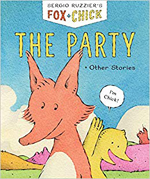 In this comic-style picture book with three humorous short stories—“The Party,” “Good Soup,” and “Sit Still”—Ruzzier introduces young readers to Fox and Chick. Cheerful pastel ink-and-watercolor illustrations and simple, repetitive text presented entirely in dialogue balloons make this book about the friendship of an unlikely pair a good choice for newly independent readers.
In this comic-style picture book with three humorous short stories—“The Party,” “Good Soup,” and “Sit Still”—Ruzzier introduces young readers to Fox and Chick. Cheerful pastel ink-and-watercolor illustrations and simple, repetitive text presented entirely in dialogue balloons make this book about the friendship of an unlikely pair a good choice for newly independent readers.
A House That Once Was. Julie Fogliano. Ill. Lane Smith. 2018. Roaring Brook.
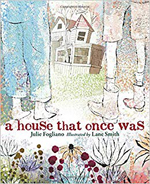 “Deep in the woods / is a house / just a house / that once was / but now isn’t / a home.” Julie Fogliano’s lyrical text and Lane Smith’s beautifully composed mixed media artwork tell how two children come upon a derelict house in the woods and wonder if the house remembers stories of “someone who we’ll never know” before returning to their own cozy and warm home.
“Deep in the woods / is a house / just a house / that once was / but now isn’t / a home.” Julie Fogliano’s lyrical text and Lane Smith’s beautifully composed mixed media artwork tell how two children come upon a derelict house in the woods and wonder if the house remembers stories of “someone who we’ll never know” before returning to their own cozy and warm home.
Julián Is a Mermaid. Jessica Love. 2018. Candlewick.
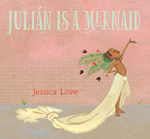 When Julián creates a lovely mermaid outfit from a gauzy curtain and dons a headdress of ferns and flowers, he is unsure how his abuela will react, but she smiles, hands him a necklace to add to his costume, and walks with him down the street to join the parade of mermaids on the beach. A series of wordless double-spread pages beautifully portray Julián’s daydream of an underwater adventure as a mermaid.
When Julián creates a lovely mermaid outfit from a gauzy curtain and dons a headdress of ferns and flowers, he is unsure how his abuela will react, but she smiles, hands him a necklace to add to his costume, and walks with him down the street to join the parade of mermaids on the beach. A series of wordless double-spread pages beautifully portray Julián’s daydream of an underwater adventure as a mermaid.
Ages 9–11
Harbor Me. Jacqueline Woodson. 2018. Nancy Paulsen/Penguin.
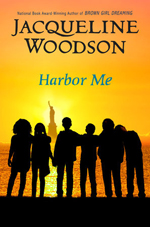 Haley recalls the events of the previous school year in which Ms. Laverne, their teacher, took a diverse group of children in a special fifth- and sixth-grade classroom to Room 501, the ARTT room—“A Room To Talk”—where they learn to express their feelings and fears about personal problems (bullying, racial profiling, deportation, and incarcerated parents), without adult supervision and within a safe community of respectful listeners, every Friday.
Haley recalls the events of the previous school year in which Ms. Laverne, their teacher, took a diverse group of children in a special fifth- and sixth-grade classroom to Room 501, the ARTT room—“A Room To Talk”—where they learn to express their feelings and fears about personal problems (bullying, racial profiling, deportation, and incarcerated parents), without adult supervision and within a safe community of respectful listeners, every Friday.
Louisiana’s Way Home. Kate DiCamillo. 2018. Candlewick.
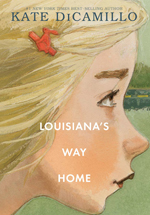 Raised by her eccentric granny, 12-year-old Louisiana Elefante believes she carries a curse of sundering (or leaving), so she is not surprised when her granny flees with her in the middle of the night. After emergency dental surgery for Granny stops their flight in a strange town, Louisiana, abandoned and befriended by strangers, discovers family secrets that change everything she thought she knew about herself.
Raised by her eccentric granny, 12-year-old Louisiana Elefante believes she carries a curse of sundering (or leaving), so she is not surprised when her granny flees with her in the middle of the night. After emergency dental surgery for Granny stops their flight in a strange town, Louisiana, abandoned and befriended by strangers, discovers family secrets that change everything she thought she knew about herself.
Merci Suárez Changes Gears. Meg Medina. 2018. Candlewick.
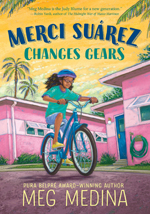 Sixth grader Merci Suárez lives with her multigenerational Cuban American family in Las Casitas. She is worried about her beloved grandfather Lolo’s Alzheimer’s, and at Seaward Pines Academy, where she and her brother, Roli, are scholarship students, bullying by Edna Santos increases after Merci is assigned to be the Sunshine Buddy for new student Michael Clark. Through it all, Merci learns that, similar to riding a bike, she must change gears and take a deep breath to keep pedaling into the future.
Sixth grader Merci Suárez lives with her multigenerational Cuban American family in Las Casitas. She is worried about her beloved grandfather Lolo’s Alzheimer’s, and at Seaward Pines Academy, where she and her brother, Roli, are scholarship students, bullying by Edna Santos increases after Merci is assigned to be the Sunshine Buddy for new student Michael Clark. Through it all, Merci learns that, similar to riding a bike, she must change gears and take a deep breath to keep pedaling into the future.
The Parker Inheritance. Varian Johnson. 2018. Arthur A. Levine/Scholastic.
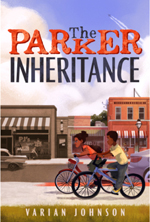 While spending the summer in the small town of Lambert, South Carolina, 12-year-old African-American Candice Miller becomes involved in deciphering clues to locate an “inheritance” in a letter she finds in a puzzle book in her deceased grandmother’s attic. Candice and Brandon Jones, a quiet, bullied, book-loving neighbor, dig into the troubled history of Lambert as they solve the puzzle mystery of the Parker inheritance.
While spending the summer in the small town of Lambert, South Carolina, 12-year-old African-American Candice Miller becomes involved in deciphering clues to locate an “inheritance” in a letter she finds in a puzzle book in her deceased grandmother’s attic. Candice and Brandon Jones, a quiet, bullied, book-loving neighbor, dig into the troubled history of Lambert as they solve the puzzle mystery of the Parker inheritance.
Ages 12–14
The Island at the End of Everything. Kiran Millwood Hargrave. 2018. Knopf/Random House.
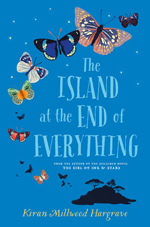 In 1906, when the Philippine government makes Culion Island a leper colony, 12-year-old “clean” Amihan is removed to an orphanage on a nearby island. When she learns that her mother, who has an advanced stage of the disease, is dying, Amihan is determined to return to Culion to say goodbye to her. An author’s note provides background for the story and Hargrave’s choice to call Culion “the island at the end of everything.”
In 1906, when the Philippine government makes Culion Island a leper colony, 12-year-old “clean” Amihan is removed to an orphanage on a nearby island. When she learns that her mother, who has an advanced stage of the disease, is dying, Amihan is determined to return to Culion to say goodbye to her. An author’s note provides background for the story and Hargrave’s choice to call Culion “the island at the end of everything.”
Tales from the Inner City. Shaun Tan. 2018. Scholastic.
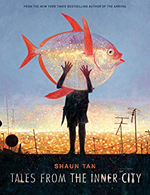 In Tan’s imaginative book of illustrated short stories and poems in which animals and humans share urban spaces, the language of the storytelling is elegant and the surreal paintings are haunting and thought-provoking. Tan’s first sentences such as “Crocodiles live on the eighty-seventh floor” and “Where money gathers, so do pigeons” grab readers’ attention, making them eager to discover how each story unfolds in words and visual images.
In Tan’s imaginative book of illustrated short stories and poems in which animals and humans share urban spaces, the language of the storytelling is elegant and the surreal paintings are haunting and thought-provoking. Tan’s first sentences such as “Crocodiles live on the eighty-seventh floor” and “Where money gathers, so do pigeons” grab readers’ attention, making them eager to discover how each story unfolds in words and visual images.
Zora & Me: The Cursed Ground. T. R. Simon. 2018. Candlewick.
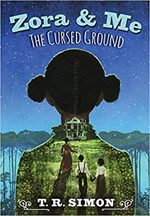 In 1855, enslaved Lucia tells the story of a covered-up murder and the curse invoked on the Westin Plantation. In 1903, in Eatonville, Florida (America’s first incorporated town built for blacks), 12-year-old Carrie Brown tells how she and her best friend, Zora Hurston, become involved in uncovering the mystery behind the attack on Horatio Polk, the town mute. The stories told by Lucia and Carrie connect past history to the events in the Eatonville community. Back matter for this fictionalized story of Zora Neale Hurston’s (1891–1960) childhood includes a biography of Hurston, a timeline, and an annotated bibliography of her books.
In 1855, enslaved Lucia tells the story of a covered-up murder and the curse invoked on the Westin Plantation. In 1903, in Eatonville, Florida (America’s first incorporated town built for blacks), 12-year-old Carrie Brown tells how she and her best friend, Zora Hurston, become involved in uncovering the mystery behind the attack on Horatio Polk, the town mute. The stories told by Lucia and Carrie connect past history to the events in the Eatonville community. Back matter for this fictionalized story of Zora Neale Hurston’s (1891–1960) childhood includes a biography of Hurston, a timeline, and an annotated bibliography of her books.
Ages 15+
Blood Water Paint. Joy McCullough. 2018. Dutton/Penguin.
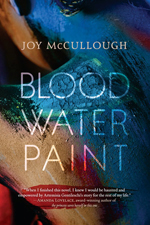 This free verse novel, interspersed with Artemisia’s deceased mother’s stories in prose, is told through the eyes of 17-year-old Artemisia Gentileschi, whose father doesn’t protect her as she is seduced by mentor Agostino Tassi. Inspired by Biblical women (Judith and Susanna), Artemisia tells how painting gives her the strength to face the truth of her abuse, bring her rapist to trial, and begin to heal. “They plunge my fingers into paint, / smear them across the outstretched cloth.” The afterword tells more about the famous Italian Baroque painter Artemisia Gentileschi (1593–1656) and the actual trial.
This free verse novel, interspersed with Artemisia’s deceased mother’s stories in prose, is told through the eyes of 17-year-old Artemisia Gentileschi, whose father doesn’t protect her as she is seduced by mentor Agostino Tassi. Inspired by Biblical women (Judith and Susanna), Artemisia tells how painting gives her the strength to face the truth of her abuse, bring her rapist to trial, and begin to heal. “They plunge my fingers into paint, / smear them across the outstretched cloth.” The afterword tells more about the famous Italian Baroque painter Artemisia Gentileschi (1593–1656) and the actual trial.
Children of Blood and Bone (Legacy of Orïsha #1). Tomi Adeyemi. 2018. Henry Holt.
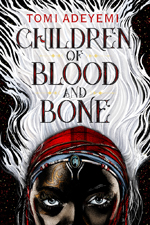 In this West African-inspired fantasy, Zélie, who remembers the night 11 years ago when King Saran hung her Maji mother and all magic disappeared in Orïsha, rescues Princess Amari, who is fleeing from her cruel father with a mysterious parchment. As Prince Inan pursues his sister Amari and Zélie (to whom he is strangely attracted) to win his father’s approval, Zélie, her brother Tzain, and Amari have only until the solstice to restore magic with three spellbinding artifacts (the parchment, a dagger, and a crystal)—or magic will be lost to Orïsha forever.
In this West African-inspired fantasy, Zélie, who remembers the night 11 years ago when King Saran hung her Maji mother and all magic disappeared in Orïsha, rescues Princess Amari, who is fleeing from her cruel father with a mysterious parchment. As Prince Inan pursues his sister Amari and Zélie (to whom he is strangely attracted) to win his father’s approval, Zélie, her brother Tzain, and Amari have only until the solstice to restore magic with three spellbinding artifacts (the parchment, a dagger, and a crystal)—or magic will be lost to Orïsha forever.
Dry. Neal Shusterman & Jarrod Shusterman. 2018. Simon & Schuster.
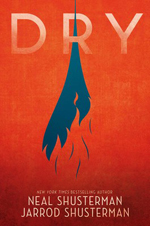 Alyssa is stunned when the governor announces that drought and shutdown of access to the Colorado River, the state’s major source of water, has left California dry. During the next 10 days, after her parents fail to return from a disaster water distribution center, chaos and destruction hit her quiet neighborhood—and the state. Alyssa, with her brother, Garrett, bands with unlikely allies (Kelton, a survivalist neighbor; Jacqui, a homeless teen; and Henry, a rich opportunist) to outlive this catastrophe.
Alyssa is stunned when the governor announces that drought and shutdown of access to the Colorado River, the state’s major source of water, has left California dry. During the next 10 days, after her parents fail to return from a disaster water distribution center, chaos and destruction hit her quiet neighborhood—and the state. Alyssa, with her brother, Garrett, bands with unlikely allies (Kelton, a survivalist neighbor; Jacqui, a homeless teen; and Henry, a rich opportunist) to outlive this catastrophe.
The Poet X. Elizabeth Acevedo. 2018. HarperTeen/HarperCollins.
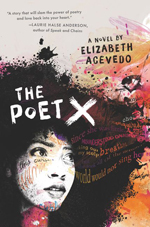 Written in English, and punctuated by Spanish, 15-year-old Dominican-American Xiomara Batista’s poetry describes her relationship with her secret boyfriend, Aman, which her overly strict Catholic mother and reformed run-around father wouldn’t tolerate if they knew about it. Joining her Harlem school’s Spoken Word Poetry Club, she performs original slam poetry under the stage name Poet X: “I stand on a stage and / say a poem. / There is power in the word," and finds a way to speak what’s on her heart.
Written in English, and punctuated by Spanish, 15-year-old Dominican-American Xiomara Batista’s poetry describes her relationship with her secret boyfriend, Aman, which her overly strict Catholic mother and reformed run-around father wouldn’t tolerate if they knew about it. Joining her Harlem school’s Spoken Word Poetry Club, she performs original slam poetry under the stage name Poet X: “I stand on a stage and / say a poem. / There is power in the word," and finds a way to speak what’s on her heart.
Speak: The Graphic Novel. Laurie Halse Anderson. Ill. Emily Carroll. 2018. Farrar, Straus and Giroux.
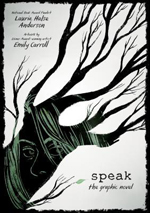 Emily Carroll’s artwork for this graphic novel of Laurie Halse Anderson’s ground-breaking novel Speak (1999) expresses the raw, debilitating terror that dominates the life of Melinda, who finds herself an outcast during her freshman year at Merryweather High School. Shunned by former friends and bullied by classmates for making a 911 call that brought police to a summer party, Melinda has been keeping secret that she was raped by a popular senior. To save herself, she must find a way to speak.
Emily Carroll’s artwork for this graphic novel of Laurie Halse Anderson’s ground-breaking novel Speak (1999) expresses the raw, debilitating terror that dominates the life of Melinda, who finds herself an outcast during her freshman year at Merryweather High School. Shunned by former friends and bullied by classmates for making a 911 call that brought police to a summer party, Melinda has been keeping secret that she was raped by a popular senior. To save herself, she must find a way to speak.
Nancy Brashear is Professor Emeritus of English at Azusa Pacific University in Azusa, California. Carolyn Angus is former director of the George G. Stone Center for Children's Books, Claremont Graduate University, in Claremont, California.
These reviews are submitted by members of the International Literacy Association's Children's Literature and Reading Special Interest Group (CL/R SIG) and are published weekly on Literacy Daily.